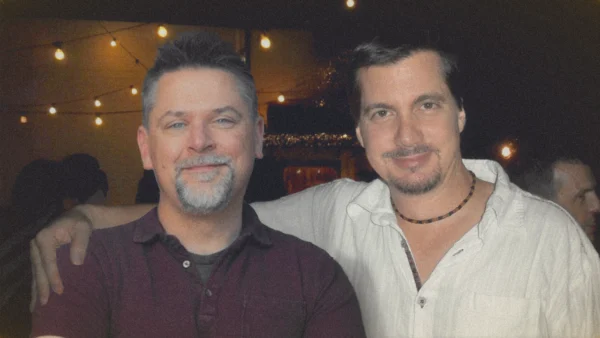Enjoy this interview from 2007, just before D.C. Douglas’ voice over career took-off!
Talent Freaks Podcast – The Art of Voiceover: D.C. Douglas on Finding His Voice in Hollywood
Watch the follow up interview to this – 18 years later!
Talent Freaks 2025 Interview
In this episode, we’re revisiting a conversation from 2007 with American actor D.C. Douglas. He’s also a very renowned voice artist known for his versatile performances across film, television, and video games. Born in Berkeley, California, D.C. has built a fascinating and unconventional acting career spanning stage, screen, and the world of video games since 1985. He’s perhaps best known for voicing Albert Wesker in the Resident Evil series and Legion in the Mass Effect series. His extensive body of work also includes appearances in cult indie films like Sharknado 2 and Black Ops, as well as numerous television roles.
I had so much fun with D.C., so I can’t wait to share this with you. Before we dive in, don’t forget to subscribe and rate Talent Freaks on your favorite podcast platform—it helps others discover these inspiring stories. So let’s head back to 2007 and let the younger version of me introduce you to D.C. Douglas.
Talent Freaks Podcast – The Art of Voiceover: D.C. Douglas on Finding His Voice in Hollywood
Andy Coon: The first thing I’d like to ask you is: how did you get into voiceover work?
D.C. Douglas: After the 127th person told me I had a great voice and should do VO, I figured I should actually try it. When I first moved to L.A. in ’85, I auditioned for various “acting schools” from the Yellow Pages—some legit, some people working out of their houses. One listing led me to Barbara Gil, who actually taught voiceover. I didn’t even know what VO was. She explained it and said it would inform my acting. I had six months before my acting workshop started, so I trained with her. She was right—word color and technical fundamentals helped me fake my way through early acting scenes. I started booking small VO gigs around 1990 with a smaller agency, but it really took off about seven years ago when I switched to Abrams Artists (ARL/ARIEL) and put more effort into it. The last couple of years were especially big because of a GEICO campaign I booked.
Andy Coon: After we started working with you at The Brooks Group, I kept hearing your voice on TV—“Hey, there’s D.C.”
D.C. Douglas: It’s probably coming to an end soon, sadly, but it was great while it lasted.
Andy Coon: Where did you move from to L.A.?
D.C. Douglas: Northern California. People say, “Not such a big move,” but when you’re 17 and move 500 miles to a city where you don’t know anyone, it’s a big move.
Andy Coon: When did you know your voice was “made for Hollywood”?
D.C. Douglas: I don’t know if it’s “made for Hollywood,” but people pay me, so I’ll take it. After puberty I had a low voice, and my mother had great diction, which rubbed off. That combo made me a target in school—tall, skinny, drama kid with precise diction. I also had fun producing elaborate outgoing messages on my answering machine, spoofing a Pacific Bell ad format, doing both announcer and “real customer” voices. That’s when I realized I could make money doing this.
Andy Coon: Watching and listening to your demo, your personality’s in there—it’s not just “all business.”
D.C. Douglas: I’d die if it were all business. Fortunately, in L.A. you pitch to a mix of business and creative folks. If the business type can’t take a joke, the creative next to them often can. For my home VO site, a lot of people try to present as bigger than they are—straight corporate tone. It backfires. It all becomes gray and boring. If your site has humor and some joy, clients facing boring copy about, say, a sludge system would rather hire someone genial who doesn’t take himself too seriously.
Andy Coon: You proved that with our project.
D.C. Douglas: Yours was different—more natural, like an actual person talking, which makes VO easier. The trouble is when copy crams nine ideas into one sentence and then clients say it sounds “sing-songy.” Well, yeah. People don’t talk that way.
Andy Coon: We first planned to use our original, but after hearing it, we went looking for an actor. Found you via Google—#1 for “voiceover.” The first take blew everyone away. Bill is in love with your read. I’m also interested in your other professional life—acting, directing.
D.C. Douglas: Directing and writing are creative outlets—hobbies adjacent to the job. Not money-makers, not fame-makers—just for expression. I’m adapting a short story my mother wrote ten years ago. We shot it on green screen to keep costs down—then I booked GEICO, had a little more money, and brought in a young animator who knows Maya and Shake. The look evolved into full Maya—think 300 or Sin City aesthetic. It’s a 17-minute film about a woman’s breakdown, lots of narration. Unusual story with an unusual treatment. Creative expression, not career strategy.
Andy Coon: And the main career—on-camera—goes through an agency?
D.C. Douglas: Same agent for about ten years—though if things don’t pick up, that could change. I started booking on-camera around 1990. It comes in waves. In ’96 I had a recurring role on NBC’s Boston Common—ten episodes. Feels like “next level,” but it’s still just a job. When it’s over, you’re not automatically at the head of the line. I once read opposite Judd Nelson for a pilot—he was reading too. It’s an endurance race: you work, then you don’t, then you do.
Andy Coon: You call yourself a “techno-weenie” on your site. Are you?
D.C. Douglas: I’m self-taught and only learn what I need. Early on I used “View Source,” copied and experimented with HTML, then moved to Flash because you can make it look like anything. That “split-brain” five-way navigation? Probably done before, but it fit me. And yes, I put real copy under the Flash—presented like disclaimers—so search engines have something to read.
Andy Coon: Which “you” do you prefer most—VO, directing, writing?
D.C. Douglas: On-camera. VO is bread and butter. I also edited for eight years as a survival gig. Built an Avid-based demo reel company for actors with a former employer, ran it for years, but as acting/VO picked up, I finally quit before 40, built a home studio, launched my site, and within three months VO income was steady. Should’ve done it earlier.
Andy Coon: I can help your mom’s site too—blogs are huge for SEO. Fresh content wins.
D.C. Douglas: That’s appealing. Updating a blog sounds easier than cracking open Flash every time I need to add a festival laurel or a status update on a film. I’d use it for VO promotion and production updates. Set me up and I’ll run with it.
Andy Coon: How do you find time? Do you have a woman in your life?
D.C. Douglas: Yes. I “ignore her.” Kidding. She works from home too—she’s a copywriter. We share a two-bedroom in Hollywood; one room is the office. I converted a closet into a vocal booth. We’re hoping to get a house soon—depends on the market. Near the hills is pricey; agents say maybe a 5% dip in a year. We’ll see.
Andy Coon: Would you avoid doing certain political ads?
D.C. Douglas: I’ve done plenty. Republicans actually hire me more often. I’ll voice for either side. If someone’s convinced by a voice alone, they’re not thinking anyway. Ethics line for me is sleazy MLM web pitches—either I pass or I quote a price so high they go away. For inflammatory scripts (anti-abortion, xenophobic immigration copy), I rationalize it as taking their money for something any VO could read, and the words are on them.
Andy Coon: What about Viagra?
D.C. Douglas: Did one I loved—“Mr. Happy.” Animated gags like a batter’s bat going limp. Campaign didn’t pan out for them, but it was fun.
Andy Coon: What’s your ideal film role?
D.C. Douglas: Not a specific “ideal”; I like roles where there’s a lot to do. I shot Dead Water with Lance Henriksen—ghost story on a ship. I was originally a scientist who gets killed. Then Lance looked at the script, made changes, and suddenly I’m CIA—the bad guy. Now I’ve got subtext, get beat up by Henriksen and Gary Stretch, then get possessed and go after them—squibs popping, stunt fighting. Loved it. Note to ADs: small loads still ring your ears—use earplugs.
Andy Coon: Do you get typecast?
D.C. Douglas: Sure. On TV I’m often the a-hole lawyer, prickish guy, serious dad. Boring but it’s work. Sometimes you get surprises—on ER I played a flamboyant florist screaming way beyond his pain threshold. That gave me a hilarious reel clip. I’d also love a messed-up Southern character—grime me up and I’m perfect.
Andy Coon: Do your “for fun” films go on YouTube, or just festivals?
D.C. Douglas: My shorts are usually 20–30 minutes, which is long for festivals. We did one lark, “80s Man,” with friends who score my films. Dinner turned into a song, then a video. Six hundred bucks, lots of rough compositing, and we pushed it online—YouTube, IFC, etc. G4 mentioned it, but they couldn’t show big chunks because of copyrighted bits (Michael Jackson and others), so they aired the dorkiest opener and critiqued it straight, which is funny given the concept. Viral is its own beast.
Andy Coon: Thank you—this has been great.
D.C. Douglas: Did we go where you needed? Feels like I hogged it.
Andy Coon: That’s the point—conversations. I’ll email you blog examples. If you have questions, call me. I’m getting into social networking and helping people get their message out online.
D.C. Douglas: Appreciate it. I’ll look for your email. I’ll try to get my mother blogging too—that may be a different adventure. Thanks, and good luck with your work.
Andy Coon: You too.
Andy Coon: Thanks for listening to this episode of Talent Freaks. D.C. Douglas’s dynamic career exemplifies the power of versatility and dedication in the performing arts. His ability to bring a wide range of characters to life across various media has left a lasting impact on audiences worldwide.
If you enjoyed this episode, don’t forget to subscribe and rate the podcast—it truly helps others discover these incredible stories. And if you want to know what I’ve been up to, check out talentfreaks.com to view some of the videos I’ve worked on, as well as the photography I’m now doing, which I absolutely love. If you have suggestions for future guests or topics, feel free to reach out—I’m always eager to bring new and exciting conversations to the podcast.
Until next time—keep exploring, keep creating, and stay curious.









